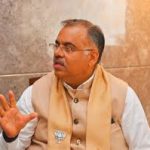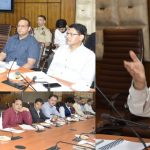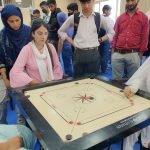Mainpuri, Aug 29: Union Minister of State (Independent Charge) Science & Technology; MoS PMO, Personnel, Public Grievances, Pensions, Atomic Energy and Space, Dr Jitendra Singh on Tuesday said that close on the heels of the successful Chandrayaan mission, India is ready with the first Sun Mission “Aditya-L1”, which ISRO is all set to launch, most likely on 2nd of September.
Addressing a public program here, Dr Jitendra said, “With the entire world celebrating India’s Chandrayaan mission, the popular interest in the Sun Mission has also increased manifold.”
Giving full credit to Prime Minister Narendra Modi, the minister said, “All this would not have been possible if the Prime Minister had not taken the courageous path-breaking decision of liberating India’s space sector from the shackles of the past which no other government had taken the initiative to do.”
As a result today, he said, within a short span of four years, ISRO’s financial resources have increased, the number of StartUps has gone up from 4 to 150 and the credibility of India’s satellite launching facility has suddenly soared so high that so far from the launching of European Satellites, India has earned more than 260 Million Euros and from the launching of American Satellite, India has earned more than 150 million US dollars.
It is because Prime Minister Narendra Modi has raised the esteem of the scientific fraternity, Dr Singh said, adding, “Today, we have the confidence and conviction to launch the first-ever space mission to the Sun.”
The Sun Space Mission Aditya-L1, Dr Jitendra Singh explained, shall use the Polar Satellite Launch Vehicle (PSLV) with seven payloads (Instruments on Board). The spacecraft shall be based in a halo orbit around Lagrange point-1(L1) of the Sun-Earth system, which is about 1.5 million Kilometre from the Earth, while a satellite placed in the halo orbit will have the major advantage of continuously viewing the Sun without any eclipses, he added.
He said that after the Mars and Moon missions, Aditya L-1 is the third such mission. “It will study the energy sources from the Sun,” he added.








